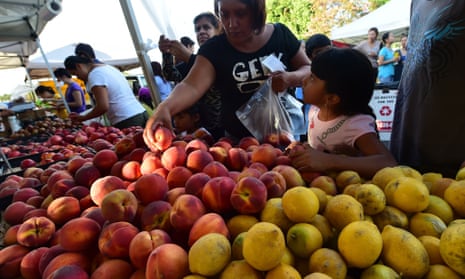No question about it: demand for fresh, local food is exploding – and the farmers markets and community-supported agriculture programs that provide it are flourishing across the US. But while these options have expanded the reach of local agriculture, they may still represent a barrier for many farmers. After all, running a CSA or working with a farmers’ market involves time-consuming logistic and administrative tasks that may be difficult or expensive for farmers to undertake. Enter Azoti, a new turnkey CSA program that makes it possible for small-to-midsize farmers and livestock producers to sell directly to customers through their workplaces.
Dave Ranallo, CEO of Azoti, started the company in 2012, when he connected 450 individual CSA subscribers, representing eight employers, with food sourced from three farms in central Ohio. Azoti takes charge of all the administrative work of a CSA – tasks like finding new customers, processing orders and running inventory – so its farmers can focus on growing rather than on selling the food. Fittingly, Ranallo derived the name of his company from the Italian word for nitrogen, an essential element for any plant’s growth process.
The companies that work with Azoti usually offer it as part of a corporate wellness program. In some ways, Ranallo acts as a broker, matching up consumers, employers and food producers, and facilitating the transactions among them. The employers do not pay any fees for the service: it’s funded by the farmers, who pay Azoti a fee equal to 17% of the cost of each CSA subscription sold through the program.
Providing structure in an insecure environment
Azoti was based, in part, on Ranallo’s observations of the agricultural problems in his region. He noticed that many farms were not growing specialty crops – generally meaning vegetables and fruits destined for consumers – because of stiff competition. Many had idle land, or had opted out of the local food market altogether. Still others turned to commodity crops because the food-distribution system did not fit their operations.
Under Azoti, Ranallo emphasizes, there are several benefits for farmers: “[They] are getting better prices than wholesale as they are not competing with other farmers and can forecast demand, which they can’t do with farmers’ markets.” In fact, to a great extent, the program allows producers to set their own prices. “We’re a partner,” Ranallo explains. “I say to them, ‘You price your CSA, I need my percentage of the CSA price, and we’ll work on that. You tell me the price and I’ll go sell to these companies.’”
Farmers aren’t the only ones who have found the Azoti business model promising: early funding included a $20,000 prize from a competition sponsored by a startup business accelerator, a $40,000 US Small Business Administration loan, and a $100,000 seed investment from a member of the Slow Money Ohio chapter.
Forging connections with local farmers
Azoti leaves the on-the-ground transportation logistics to the farmers and their customers. Rather than going to markets, the farmers drive to the employers’ offices during the workweek, enabling them to build relationships with their subscribers and giving employees a chance to meet and chat with the people who grow their food.
Building personal relationships with customers is only one of the CSA-style benefits to Azoti farmers. Another is security: farmers working with the company receive payment up front before the growing season, so they know better what crops to plant and how to manage their livestock. Because of this forward planning, the program’s subscribers share some of the risks that the farmers take on each season. If weather conditions decrease the harvest, the weekly food volume will be affected as well.
Admittedly, this leads to other issues: managing customers’ expectations about the harsh realities of farming – the variability of harvests and pricing, for example – is an ongoing challenge. For that matter, any issue affecting the farmers – such as regulations, weather, debt – in turn may impact customers, a risk inherent in the Azoti business model.
While Azoti competes with traditional CSAs, farmers’ markets, and stores selling local food, its key competition includes Farmigo, a company that provides software for CSA programs and links farmers to consumers by building a network of food communities or CSA pick-up points.
Taking corporate wellness one step further
Regarding future plans for growth, Ranallo sees lots of opportunity. “We’ll be a national player. We can launch a new marketplace for any farmer, even around the world,” he says. “Also, employers are heavily incented around preventative measures, so we want to bring in a ‘farm-2-fork coach’ – a person who could give seminars and tie food to other wellness activities such as weight loss and hypertension management.”
In 2013, Azoti ran pilots in New York City and Sacramento, California, two cities surrounded by farming communities. Ranallo hopes that at some point medical insurance plans will cover CSAs as a type of wellness program; he cites the Mayo Clinic, which gives its employees about $200 a month for either a gym membership or a CSA subscription.
“We’re trying to get people more involved with what they eat, to reconnect people to their food,” says Ranallo. “We want people to touch their food and accelerate their food awakening, so they can make changes to their diet and eat healthy, fresh food.”
This is an extract adapted from The Transformation of American Agriculture by Kathy O Brozek.
Kathy O Brozek is a management consultant to nonprofit organizations and businesses aiming to create positive social change. She found her way to nonfiction writing after a career in financial services with the Fortune 500 and has published articles in Stanford Social Innovation Review and the Federal Reserve Bank of San Francisco’s Community Development Investment Review.
The supply chain hub is sponsored by the Fairtrade Foundation. All content is editorially independent except for pieces labelled advertisement feature. Find out more here.

Comments (…)
Sign in or create your Guardian account to join the discussion